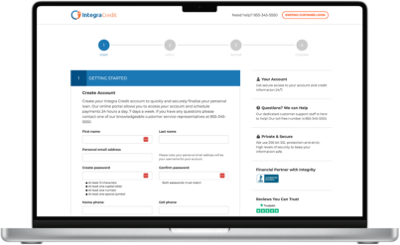Lenders, employers, and other entities rely on your credit score to help determine your creditworthiness and responsibility. Because the information in your credit file is confidential, only legally permitted entities can access it through a credit inquiry. Let’s answer the question “What is a credit inquiry” and explore the difference between a soft inquiry and a hard inquiry.
Key Takeaways
- A credit inquiry is a request by an authorized party to access your credit file.
- There are two types of inquiries: soft inquiries and hard inquiries.
- Hard inquiries can reduce your credit score and remain on your report for up to two years.
- Soft inquiries do not affect your credit score and are invisible to lenders and creditors.
- If you see a credit hard inquiry you did not authorize, you can dispute it with the credit bureaus.
What Is a Credit Inquiry?
A credit inquiry is a request by a lender, employer, landlord, or other authorized party to access your credit file from one or more than one of the credit bureaus or credit reporting agencies. A credit reporting agency is a business that keeps historical credit information and data on consumers and businesses. Credit bureaus receive reports and information from lenders and many other sources about your history managing credit accounts and debt. The three credit bureaus or credit reporting agencies are:
- Equifax
- Experian
- Transunion
Credit reporting agencies calculate credit scores, provide credit reports, and maintain credit information, including when potential creditors request credit inquiries.
What Are Credit Inquiries For?
Credit inquiries can be requested for several reasons. Often, credit inquiries happen when you apply for credit, such as an auto loan, credit card, personal loan, or other lending products. Other common instances when a company or individual may request a credit inquiry include:
- Employer background checks
- An account review by a company you do business with
- Starting utilities with a provider
- Apartment rental applications
- Checking your own credit
- Insurance applications
- Credit limit increases
- And more
What Are the Two Types of Credit Inquiries: Soft Inquiry vs. Hard Inquiry?
Not all credit inquiries are created equal. For example, credit bureaus do not consider you checking your credit or an employer performing a background check on equal footing as applying for a mortgage. To differentiate, credit inquiries will fall into one of two categories:
- Hard Inquiry
- Soft Inquiry
What Is a Hard Inquiry?
Whenever you complete an application for a credit card, personal loan, or other lending product, the lender will perform a hard inquiry. Also known as “hard credit checks” or “hard pulls,” hard inquiries are when your credit file is accessed to make a lending decision. Information provided on a hard credit check includes:
- Credit score
- Open credit accounts and balance
- Type of loans, such as an unsecured loan
- Number of hard inquiries
- Payment history
- Age of credit accounts
- Tax liens
- Collection agency accounts
- Public Records
- And more
Some credit scoring models, such as VantageScore and FICO, interpret a hard inquiry as an increase in risk and may lower your score. According to FICO, hard inquiries can reduce your score by less than five points, typically rebounding within a few months. It can stay on your credit report for up to two years.
What Is a Soft Inquiry?
Because of the potential negative implications of a hard inquiry, certain entities use a soft pull, soft credit check, or soft inquiry. Soft inquiries are usually associated when a company or person retrieves your credit file for a background check or preapproval. A soft inquiry provides the same information as a hard inquiry without the negative implications to your credit score. In fact, soft inquiries have no impact on your credit score; and when a creditor accesses your credit file, they can’t see soft inquiries. However, you may spot soft credit checks when you access your credit file.
Examples of Soft and Hard Credit Inquiries
Whenever you provide your information, it’s vital to understand whether it’s a soft vs hard credit check. Each one can have different implications for your credit score. Soft pulls are usually conducted for checking eligibility, while hard pulls are more common when a full application is submitted, and in some cases, when the applicant is granted credit.
Examples of a Hard Credit Inquiry
Hard inquiries are typically used when an application is submitted, and sometimes only when the individual gets funded. Examples of this include:
- Applying for a In fact, secured or unsecured credit card
- Applying for a personal loan
- Applying for a mortgage, mortgage refinance, home equity loan, or home equity line of credit
- Applying for an auto loan or auto lease
- Applying for a student loan
Examples of a Soft Inquiry
Soft inquiries are typically used for background checks by employers and pre-screening purposes by lenders, such as:
- Employer background checks.
- You check your own credit.
- A current lender determines whether you’ll receive a credit limit increase.
- You apply for an auto loan pre approval.
- A credit card company determines whether you qualify for pre approval offers.
How Do You Know If a Company Runs a Soft vs Hard Credit Check?
Every company can have different practices of pulling a soft inquiry vs. hard inquiry. For instance, renting an apartment and opening a bank account may result in a hard or soft inquiry, depending on the company or individual’s practices. The only way to know whether it will be a soft inquiry vs. hard inquiry is to ask.
How to Dispute Hard Credit Inquiries?
If you see a hard inquiry you do not recognize or have been a victim of fraud, you can dispute it.
- Contact the reporting company and credit bureau (Transunion, Equifax, and/or Experian).
- Explain why the inquiry is wrong and include supporting documents.
If you use Credit Karma or another credit monitoring system, you may be able to submit the dispute through the platform. You can also go directly to each bureau’s website to submit credit inquiry disputes:
- Dispute an Experian credit inquiry.
- Dispute an Equifax credit inquiry.
- Dispute a Transunion credit inquiry.
FAQs
- Does Checking Your Credit Score Lower It? No, personally checking your credit score doesn’t lower it. Instead, reviewing your credit report is a smart way to ensure all information is accurate. It’s the only way you can see what lenders and creditors see.
- Can You Dispute a Hard Inquiry? Yes, you can dispute a hard inquiry. To do so, you should file a dispute with each credit bureau where the inquiry is listed.
- How Long Do Soft and Hard Inquiries Stay on My Credit Report? Soft inquiries remain on your credit report for about two years but are only visible to you. Hard inquiries, on the other hand, also stay for up to two years but have a more significant impact on your credit score during the first year.
Bottom Line
Understanding the impact of hard vs. soft credit inquiries is fundamental to managing your credit score and finances. For example, if you have several hard credit pulls within a short period of time, it can cause lenders to consider you a higher-risk customer. It can signal you are potentially in dire financial straits or on the fast track to racking up significant debt. The only way to prevent this is to proactively monitor your credit score and strategically submit applications that can result in a hard inquiry.
Apply in minutes, quickly & securely
- Complete an online application
- Receive a decision quickly
- Review and sign the agreement
- Get cash directly into your bank account






